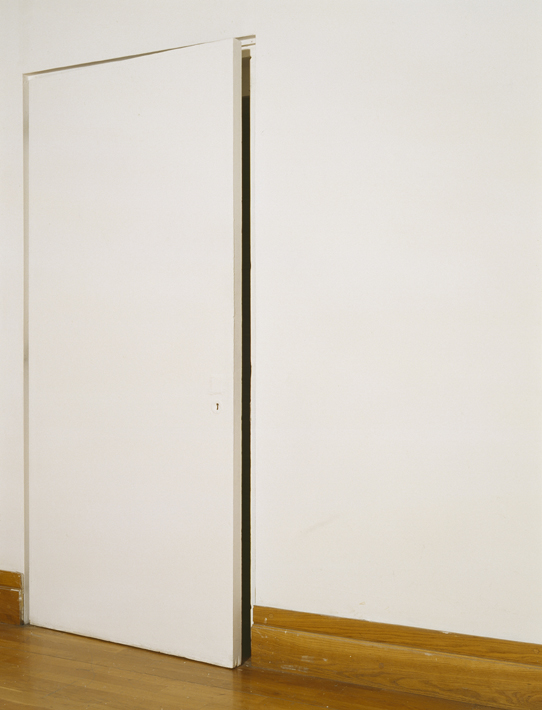

ECHO, 2004
Audio work.
Installation at the RHA Gallery, Dublin
Audio simulation of the remaining sound of the Big Bang by scientist John G. Cramer installed in a room/closet, with the door left ajar. This white noise emanates throughout the gallery, while its source remains ambivalent.
"Beginning from scratch, without precedent, without a past, without resources and materials from which to begin, and without an idea of what beginning from scratch might be – this is the impossible task of the Romantic artist. Romanticism searches out a cultural twilight in which to free itself from historical burden. Call it genius, call it imagination, the twilight that Romanticism urged was the foreclosure of the Classicist heyday and the elimination of its institutionalisation of ‘copying’. Blake, in his marginalia of Reynolds’ ‘Discourses’, repeatedly highlighted copying as a form of knavery, for, He who copies does not Execute he only Imitates what is already Executed. Execution is only the result of Invention. Romanticism is fascinated with the ur-idiom, the origin of originality, both as technique and as sublime imagery. Walker and Walker take up this Romantic idiom of the origin in their sound work ‘Big Bang’, which is a simulation, in collaboration with Professor John G. Cramer, of the sound of the remaining echo of the Big Bang. It is the ur-sound, the sound of the ur-event, the origin without ground, the unprecedented precedent of everything. And yet, what we hear is an echo, a trace, a ripple – the origin is absent. This sound, an emissary of the origin of everything, is not the origin itself. Installed within a dark room with the door slightly ajar, ‘Big Bang’ presents the slenderest glimpse of absolutely everything. It is an appropriated sound, a found object that iterates the origin, and in a sound that we have never heard before. Originality, including the ur-precedent of the pluriverse, appears, after prolonged delay, in another form. Originality doesn’t cheat us when it takes other forms; this is the only way that originality can appear."
Extract from Allegories of Reverie by David Beech
See also Until now
Audio work.
Installation at the RHA Gallery, Dublin
Audio simulation of the remaining sound of the Big Bang by scientist John G. Cramer installed in a room/closet, with the door left ajar. This white noise emanates throughout the gallery, while its source remains ambivalent.
"Beginning from scratch, without precedent, without a past, without resources and materials from which to begin, and without an idea of what beginning from scratch might be – this is the impossible task of the Romantic artist. Romanticism searches out a cultural twilight in which to free itself from historical burden. Call it genius, call it imagination, the twilight that Romanticism urged was the foreclosure of the Classicist heyday and the elimination of its institutionalisation of ‘copying’. Blake, in his marginalia of Reynolds’ ‘Discourses’, repeatedly highlighted copying as a form of knavery, for, He who copies does not Execute he only Imitates what is already Executed. Execution is only the result of Invention. Romanticism is fascinated with the ur-idiom, the origin of originality, both as technique and as sublime imagery. Walker and Walker take up this Romantic idiom of the origin in their sound work ‘Big Bang’, which is a simulation, in collaboration with Professor John G. Cramer, of the sound of the remaining echo of the Big Bang. It is the ur-sound, the sound of the ur-event, the origin without ground, the unprecedented precedent of everything. And yet, what we hear is an echo, a trace, a ripple – the origin is absent. This sound, an emissary of the origin of everything, is not the origin itself. Installed within a dark room with the door slightly ajar, ‘Big Bang’ presents the slenderest glimpse of absolutely everything. It is an appropriated sound, a found object that iterates the origin, and in a sound that we have never heard before. Originality, including the ur-precedent of the pluriverse, appears, after prolonged delay, in another form. Originality doesn’t cheat us when it takes other forms; this is the only way that originality can appear."
Extract from Allegories of Reverie by David Beech
See also Until now